最新英美报刊选读2016-3-21NewsLead分析解析
- 格式:ppt
- 大小:436.00 KB
- 文档页数:53
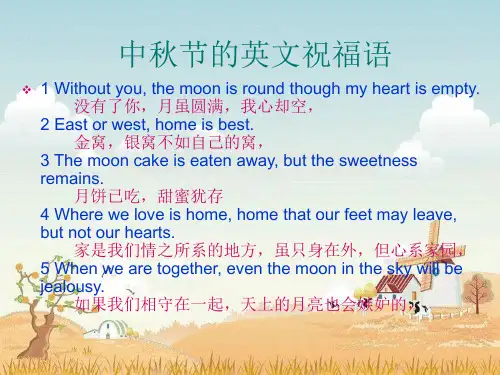
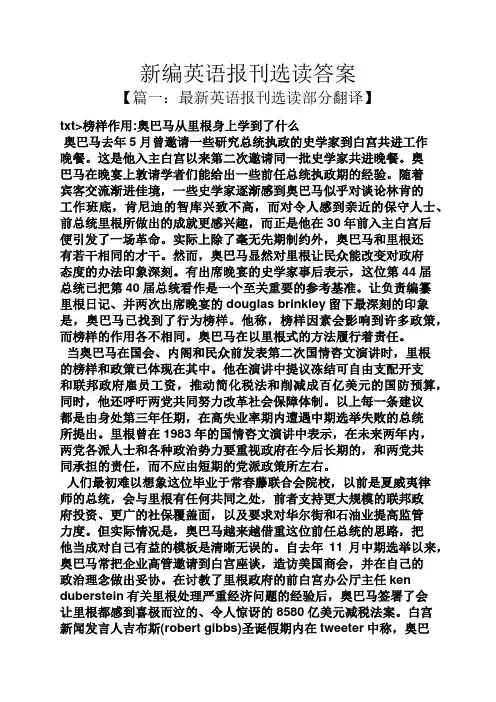
新编英语报刊选读答案【篇一:最新英语报刊选读部分翻译】txt>榜样作用:奥巴马从里根身上学到了什么奥巴马去年5月曾邀请一些研究总统执政的史学家到白宫共进工作晚餐。
这是他入主白宫以来第二次邀请同一批史学家共进晚餐。
奥巴马在晚宴上敦请学者们能给出一些前任总统执政期的经验。
随着宾客交流渐进佳境,一些史学家逐渐感到奥巴马似乎对谈论林肯的工作班底,肯尼迪的智库兴致不高,而对令人感到亲近的保守人士、前总统里根所做出的成就更感兴趣,而正是他在30年前入主白宫后便引发了一场革命。
实际上除了毫无先期制约外,奥巴马和里根还有若干相同的才干。
然而,奥巴马显然对里根让民众能改变对政府态度的办法印象深刻。
有出席晚宴的史学家事后表示,这位第44届总统已把第40届总统看作是一个至关重要的参考基准。
让负责编纂里根日记、并两次出席晚宴的douglas brinkley留下最深刻的印象是,奥巴马已找到了行为榜样。
他称,榜样因素会影响到许多政策,而榜样的作用各不相同。
奥巴马在以里根式的方法履行着责任。
当奥巴马在国会、内阁和民众前发表第二次国情咨文演讲时,里根的榜样和政策已体现在其中。
他在演讲中提议冻结可自由支配开支和联邦政府雇员工资,推动简化税法和削减成百亿美元的国防预算,同时,他还呼吁两党共同努力改革社会保障体制。
以上每一条建议都是由身处第三年任期,在高失业率期内遭遇中期选举失败的总统所提出。
里根曾在1983年的国情咨文演讲中表示,在未来两年内,两党各派人士和各种政治势力要重视政府在今后长期的,和两党共同承担的责任,而不应由短期的党派政策所左右。
人们最初难以想象这位毕业于常春藤联合会院校,以前是夏威夷律师的总统,会与里根有任何共同之处,前者支持更大规模的联邦政府投资、更广的社保覆盖面,以及要求对华尔街和石油业提高监管力度。
但实际情况是,奥巴马越来越借重这位前任总统的思路,把他当成对自己有益的模板是清晰无误的。
自去年11月中期选举以来,奥巴马常把企业高管邀请到白宫座谈,造访美国商会,并在自己的政治理念做出妥协。

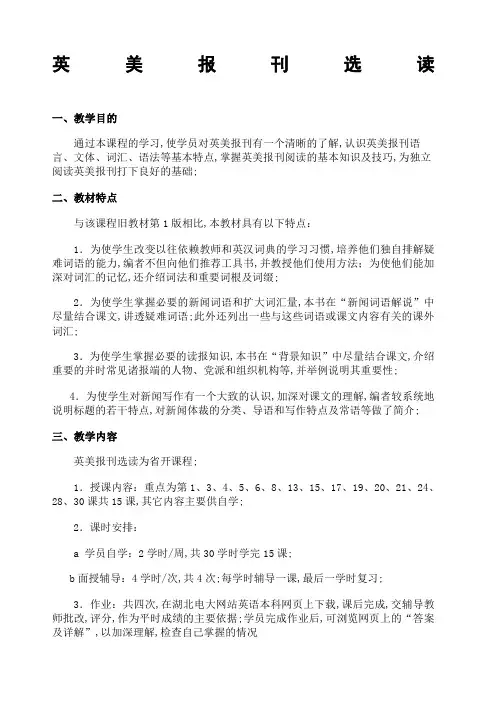
英美报刊选读一、教学目的通过本课程的学习,使学员对英美报刊有一个清晰的了解,认识英美报刊语言、文体、词汇、语法等基本特点,掌握英美报刊阅读的基本知识及技巧,为独立阅读英美报刊打下良好的基础;二、教材特点与该课程旧教材第1版相比,本教材具有以下特点:1.为使学生改变以往依赖教师和英汉词典的学习习惯,培养他们独自排解疑难词语的能力,编者不但向他们推荐工具书,并教授他们使用方法;为使他们能加深对词汇的记忆,还介绍词法和重要词根及词缀;2.为使学生掌握必要的新闻词语和扩大词汇量,本书在“新闻词语解说”中尽量结合课文,讲透疑难词语;此外还列出一些与这些词语或课文内容有关的课外词汇;3.为使学生掌握必要的读报知识,本书在“背景知识”中尽量结合课文,介绍重要的并时常见诸报端的人物、党派和组织机构等,并举例说明其重要性;4.为使学生对新闻写作有一个大致的认识,加深对课文的理解,编者较系统地说明标题的若干特点,对新闻体裁的分类、导语和写作特点及常语等做了简介;三、教学内容英美报刊选读为省开课程;1.授课内容:重点为第1、3、4、5、6、8、13、15、17、19、20、21、24、28、30课共15课,其它内容主要供自学;2.课时安排:a 学员自学:2学时/周,共30学时学完15课;b面授辅导:4学时/次,共4次;每学时辅导一课,最后一学时复习;3.作业:共四次,在湖北电大网站英语本科网页上下载,课后完成,交辅导教师批改,评分,作为平时成绩的主要依据;学员完成作业后,可浏览网页上的“答案及详解”,以加深理解,检查自己掌握的情况四、教学建议教师授课时应以学生为中心,鼓励学生自己去探索和获取知识;在上课时,可要求学生先回答每课后的练习题—— Questions,使他们基本了解课文的主要内容;然后,再逐段或跳跃式选段对学生需要掌握的内容、新闻词语和背景知识进行阅读和问答式方式讲解;如果备课充分,学生的英语水平又高,教员可采用美英教员教授母语的方法,抛开课本或讲义,只讲有关课文的重点词语、背景知识和写作手法等;这样,学生除预习外,课后还要结合教员在课堂上所讲的内容好好复习课文;这两种授课方式的好处是,使学生通过自学指预习和教师的指导,自己主动去掌握知识;与以教员为中心的灌输式教学方式相比,学生更能巩固所学,并使他们今后更能发挥学习潜能;此外,这也使有的教员摆脱了那种课文注释那么详细而觉得在课堂上没有多少可讲的被动地位和局面;当然,这只是本人的实践和看法;我相信在调动学生主动学习的积极性方面还有更多、更好的教学法;五.考试说明“英美报刊选读”期末考试题型介绍1.报刊名称及常见报刊词汇英译汉:十小题,每题2分,共20分内容以辅导书的附录为主.2.阅读理解:2篇文章,选自作业题,选择题或判断题,共40分;3.阅读与翻译:一篇文章,选自教材重点课目练习,共40分;1.问答题:20分; 2.段落英译汉:20分;六.课程辅导英美报刊选读辅导一Newspapers and HeadlinesDo you have the habit of reading newspapers in EnglishWhat newspapers do you like to readThe following is a list of the major newspapers in Britain and the United States.●The major newspapers in BritainDailies SundaysThe Times News of the WorldThe Guardian The ObserverFinancial Times The Sunday PeopleThe Daily Telegraph Sunday MirrorDaily Express The Sunday TelegraphDaily Mail The Sunday TimesDaily Mirror●The major daily newspapers in the United StatesNew York Times USA TodayWashington Post Chicago Daily TribuneLos Angeles Times Detrolt NewsWall Street Journal New York Daily NewsChristian Science MonitorNewspapers ,along with reporting the news ,instruct ,entertain, and give opinions. A newspaper has separate sections: world news, national and local news, sports, business ,entertainment, opinions, comics, classified ads,etc.You can be a better reader if you know what to expect in a example, when you read a newspaper you usually look quickly at headlines first. Newspaper headlines have a language of their own and it is necessary to learn about read the following headlines:Moscow official wounded by gunmenEarthquake rocks TurkeyHusband to sue wifeBoy on cliff rescuedYoung Sudanese refugees endured famine, separations from familyFrom above we can see two prominent features of English newspaper headlines:☆Headlines are almost always in the present tense and even future events are put in the present tense;☆Headlines generally omit unnecessary words, especially articles and the verb to is often replaced by a comma.Newspaper headlines can be classified into several types:☆ Straight headlines give you the main topic of the are the most common type of headline and are the easiest to understand.Snow has chilling effects on SouthClinton offers Bush advice.☆ Headlines that ask a question,report a future possibility or offer some doubt about the truth or accuracy of the story.Can technology fix ballot woesDo market analysts have bad aim or bad intentions☆ Headlines that contain a quotation which is important or which shows that a statement is not proven.Mother:Let my baby go“We won’t quit”☆ Double headlines are two-part headlines for the same story and are often used for major events.How Express broke diplomatic silenceHUSH-UP ON “SPY” ENVOYS☆ Feature headlines are used for stories that are either highly unusual or for such stories try to be as clever as possible to catch the reader's interest.Teletubbles maker seeks funds for expansionDead student fell under the crush during clashes英美报刊选读辅导二Understanding Headline VocabularyEnglish newspaper headlines use a special headline contracts a lot of information into a short space and hence in headlines we often see●Short words used instead of long ones. aid=assist bare=expose or reveal;blast=explode probe=investigationwoo=seek to win●Abbreviations such as short names which can be used when they are likely to be identified by the initials are used whenever possible.. Close-up on WILLWILL=Willam ShakespeareYard smash airport gangYard=Scotland YardMP slams hospital delayMP=member of Parliament●shortened words and slang. Weekly mag for stamp lovers to be launchedmag=magazineBr fly into stormover plgeon banBr=BritainOlivier denies “blackmail” jibejibe=an insulting attackThe following is a list of words with their common headline to be famillar with these words.Word Common headline meaning ExamplAccord agreement Accord possible todayAir to make known TV airs “facts” on arms delivery Assail to criticize strongly Russ assails US on A-testsAxe to dismiss from a job Governor to axe aideBack to support Algeria backs decision to ignore dollar Balk to refuse to accept Union balks at court orderBar not to allow Club faces shutdown for barring women Bid attempt Bid to open borderoffer Union rejects latest bidBilk to cheat Clerk bilks company of $1mBlastnoun explosion;strong criticism Tanker blast near Manila verb criticize strongly MP blasts democratsstrike with explosivesblaze fire Blaze kills threecite mention Management cites labor unrest forshutdownclaim to declare to be true Man claims ghost sighting claimclaim to kill Bombs claim40the life ofclashnoun battle; dispute Marine dies in clashverb disagree strongly;fight Mayor clashes with city council cool uninterested; unfriendly Moscow cool to aid offercurb limit; control Sunday driving curbs planned deadlock a disagreement that Jury deadlock in kidnap trial cannot be settleddrive a strong well-planned effort Cancer drive exceeds goal by a group for a particularpurposedue expected Greek FM due todayeye to watch with interest Women's groups eye court vote ease to reduce or loosen Rome eases martial laweve the day before Violence on eve of independence fault to find in the wrong Study faults policefeud dispute; Border feud danger to regional peace strong disagreementflay accuse;criticize strongly US flays Russiafoe opponent; enemy Clinton talks with congressional foes foil to prevent from succeeding FBI folls bid to hijack plane to Iran grip to take hold of Cholera fear grips Japangut to destroy completely by fire Year's biggest fire guts 178 homes head off to prevent President heads off rail strike heist theft Jewel heist foiledhold keep in police control; 7 held for smugglingarrestink to sign Thailand,Malaysia ink sea treaty key very important Gov' key votekick off to begin Fiery speech kicks off campaign lash out criticize strongly; College heads lash out at NUSaccuselaud to praise PM lauds community spiritline position;demand Israel softens linelaunch to begin Police launch anti-drug drivelink connected to Fungus linked to mystery diseas loom expected in the near Treaty dispute loomingfuturelootnoun stolen money or goods Police recover lootverb unlawful taking away of Rioters loot stores goodsvaluablenab to capture Gang leader nabbednet to take possession of; Customs check nets over $2m capturenod approval Minister seeks nod for oil saving plan office an important government Minister quits,tired of office positionopt choose;decide Swiss opt to back tax for churches oust to take power away from Voters'oust incumbentspact a solemn agreement Peace pact todayPlea deeply felt request Mother's plea;Let me see my babya statement in court indicating Guilty pleas expectedguilt or innocence Guilty pleas expectedpledge promise IOC pledges supportpoised ready for action Workers poised to strikepoll election October pollVoting station Voters go to the polls in JapanPost position in government, Unknown gets key Cabinet post BusinessProbe investigation Governor orders fire probePrompt to cause Court decision prompts public anger Rage to burn out of control Forest fire ragesRapnoun accusation charge Corruption rap unfair says senator verb criticize Safety commission raps auto companies rock to shock;to surprise Gov' rocks stock marketrout defeat completely Rebels routed,leave 70 deadrow a quarrel Oil price row may bring down gov't. rule decide Court rules out PLO talkssack dismiss from a job Jail chief sackedsackfrom to search thoroughly and rob 14 held for US embassy sacking “ransack”set decided on;ready IMF talks set for Aprilslay to kill or murder 2 slain in family rowsnag problem;difficulty Last minute snag hits arms talkssnub to pay no attention to Protestants snub Ulster peace bidsoar to rise rapidly Inflation rate soarsspark to cause;to lead to action Frontier feuding sparks attack stalemate a disagreement that cannot be settledNew bid to break hostage stalematestall making no progress Peace effort in Lebanon stalled stance attitude;way of thinking New stance toward power cuts stem to prevent or stop Rainy season stems refugee exit sway to influence or persuade President fails to sway union-strike set swindle an unlawful way of getting money Stock swindle in NY thwart prevent from being successful Honduras attack thwarted ties relations Vietnam ties soonTrim to cut Senate trims budgetTrigger to cause Killing triggers riotVie to compete Irish top ranks vie for officeVoid to determine to be invalid Voting law voides by courtVow a solemn promise Police chief vows to catch kidnappersWeigh to consider Bush weights tax increase英美报刊选读辅导三The Newspaper LeadThe first paragraph of a news story is called the lead. It almost always gives you the story's main topic and most important facts. When you read a newspaper lead sentence, try to find the subject and main verb and note how the rest of the sentence adds information to the subject and main verb.Anwar Sadat Assassinated at Cairo Military ReviewCAIRO,October7-Egyptian President Anwar Sadat, a modern-day pharaoh who attempted to lead the Arab world toward a permanent Mideast peace with Isreal, was assassinated yesterday by a band of soldiers who attacked a military parade reviewing stand with automatic rifles and hand grenades.Note that a great deal of information is included in a single writer has organized the sentence around the subjectEgyptian President Anwar Sadatand main verbwas assassinate very carefully.The lead sentence usually does the following:●Answers questions such as “who”“what”“where” “when”“result”●Adds background to help you better understand the story orState where the source of the story comes from.英美报刊选读辅导四Read the News StoryIn most news stories the most important facts will be found near the beginning-usually within the first two or three remainder of the story will give details explaining and clarifying the main points,or introducing new,but less important information.The following is a formula for a typical news story;●Paragraph OneThe story's subject and most important facts.●Paragraph TwoImportant facts that the writer was unable to include in the lead;Information to clarify the facts in the lead;A particularly important quote.●The rest of the storySpecific details to answer readers' questions;Statements and opinions by people involved in the story or by outside observers;Background information;New,but less important facts.Accordingly, when you read a news story, you are to:●Read the beginning of the story very carefully because it containsthe most important fact.●Try to look for more facts than those given in the lead.●If you don't understand something at the beginning of a story, keep reading for a secondand perhaps a third chance to understand.英美报刊选读辅导五Reading the Feature Story in a NewspaperIn most news stories the main points come very early and less impotant information comes is another kind of story_the feature story which follows a different format,the feature format.Popular Magazines and Magazine ArticlesReading popular magazines is a good way to enlarge our vocabulary and learn a little bit about many topics in following is a list of major magazines in Britain and the United States.●Magazines in BritainThe Economist Britain TodayThe Spectator Contemporary ReviewNew Statesman London MagazineNew Scientist Observer ReviewThe Listener PunchBritish Weekly●Magazines in the United StatesTime US News & World ReportNewsweek Reader's DigestLife Business WeeklyFortune Harper'sPeople American ReviewThe New YorkerVery often we read magazines while traveling or relaxing of magazine articles do not expect their audience to spend too much time reading and try to make the main ideas stand out clearly. The task for the reader is to locate these main ideas quickly.Popular magazine writers use various devices to capture a reader's attention:clever titles,short paragraphs and compound nouns to economize on in magazine often have characteristics similar to those found in news stories or articles found in are some feautures of magazine articles:●An introductory paragraph summarize the main idea;●The details are given in the rest of the articles;●The author's view of the subject is directed to a particular audience butmay interest readers in general.英美报刊选读辅导六Reading AdvertisementsMost magazines and newspapers contain advertisements that are designed to make us want the want us to believe that their product is important for a good life. Some advertisements even present viewpoints ontimely newspaper ads try to influence the reader's opinions.The language of advertising must be a language of immediate impact and rapid persuasion. No one is likely to spend much time deciding whether to read a printed advertisement or listen to a spoken one:If their attention is not attracted immediately and held firmly for the short amount of time necessary to absorb what is being said. Then the advertisement will have miserably. So the advertising language uses a basically simple grammatical structure and a richly suggestive and descriptive vocabulary.Read the following ad.Only the cream of the crop filesOur chefs buy only the freshest and most expensive ingredients for our kitchens.Anywhere.Because they believe that good food really is the way to a person's heart.Obviously, there are many who would agree.In fact, experienced travelers have rewarded Swissair with the greatest percentage of repeat business.Which is not something we take lightly.Because travelers who fly more, expect more.So our chefs prepare five gourmet selections for every flight. Plus any one of 15 different special meals on request:Hindu,Kosher,Moslem,diabetic,slat-free,vegetarian,dietetic…you name it.Only the best will please Swissair passengers.The cream of the crop.Swissair has worldwide departures from New York, Boston, Chicago, Montreal and Toronto.Call Swissair of your travel expertSWISSAIRIn the above ad, a great deal is said in a few words. We see short sentences, vivid language, and many informal, popular expressions. They appeal to all of the senses.When you read an advertisement, you may:●Look for the hidden message; the way in which an advertiser uses words and pictures to influence readers opinions and attitudes.●Read between the lines for meanings implied rather than clearly stated.●Find the source of its appeal to the senses.。

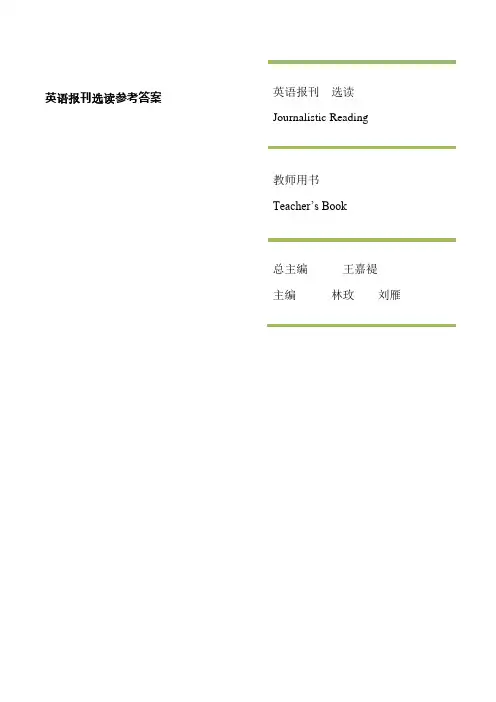
英语报刊选读参考答案英语报刊选读Journalistic Reading教师用书Teacher’s Book总主编王嘉褆主编林玫刘雁BOOK ONE (2)UNIT 1 Campus (2)UNIT 2 Entertainment (5)UNIT 3 Entertainment (9)UNIT 4 Food (12)UNIT 5 Crime (15)UNIT 6 Disaster (19)UNIT 7 Sports (23)UNIT 8 Art (28)UNIT 9 Economy (31)UNIT 10 Ecology (36)UNIT 11 Health (39)UNIT12 Automobile & Driving (43)UNIT 13 Quality problems (48)UNIT 14 Shopping (52)UNIT 15 Gun control (56)UNIT 16 Psychology (59)BOOK ONEUNIT 1 CampusI.Vocabulary Builder1.Definition1)chaotic: extremely disorganized; badly organized; be in mess2)primary: main; most important; key; major; chief; prime; principal3)seduce: attract; tempt4)highlight: the most important, interesting, or enjoyable part ofsomething such as a holiday, performance, or sports competition5)reluctant: unwilling6)compelling: very interesting or exciting, so that you have to payattention7)reveal: show; indicate8)mainstream: accepted by or involving most people in a society;normal; ordinary9)critical: important; crucial10)evolution: a long, gradual process during which something developsand changes, usually becoming more advanced; a gradual change and development2. Terms translation1) a bipartisan consensus2)high school diploma3)drop-out rate4)college wage premium5)the K-12 system6)more academically rigorous7)well-rounded citizens8)certification tests9)career and technical education3. Blank filling1) persevered 2) persisted 3) insisted 4) insisted 5) persevere6) agony 7) adversity 8) torment 9) plight 10) assure/reassure11) insure/ensure 12) insure 13) insure/ensure 14) assured/reassuredII.Translation1.选择圣路易斯的华盛顿大学是个不错的决定,但真正让我享受到理想大学生活的,(不是大学本身)是我到了大学后作的一些决定。
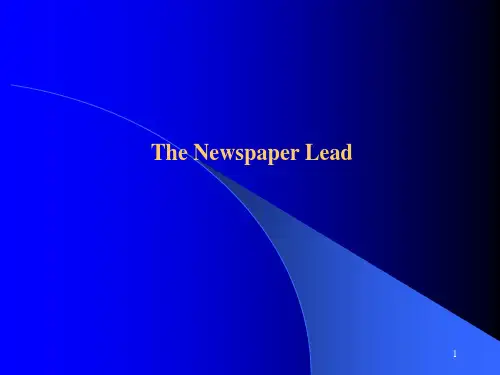
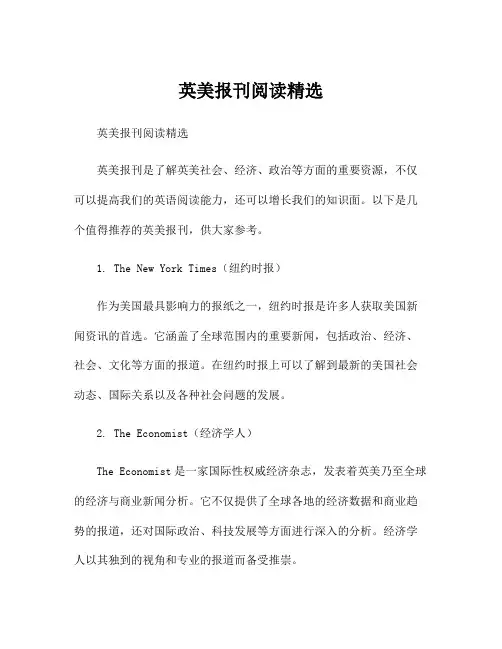
英美报刊阅读精选英美报刊阅读精选英美报刊是了解英美社会、经济、政治等方面的重要资源,不仅可以提高我们的英语阅读能力,还可以增长我们的知识面。
以下是几个值得推荐的英美报刊,供大家参考。
1. The New York Times(纽约时报)作为美国最具影响力的报纸之一,纽约时报是许多人获取美国新闻资讯的首选。
它涵盖了全球范围内的重要新闻,包括政治、经济、社会、文化等方面的报道。
在纽约时报上可以了解到最新的美国社会动态、国际关系以及各种社会问题的发展。
2. The Economist(经济学人)The Economist是一家国际性权威经济杂志,发表着英美乃至全球的经济与商业新闻分析。
它不仅提供了全球各地的经济数据和商业趋势的报道,还对国际政治、科技发展等方面进行深入的分析。
经济学人以其独到的视角和专业的报道而备受推崇。
3. The Guardian(卫报)作为英国的一家重要报纸,卫报以其较为自由、开放的编辑方针而广受欢迎。
它关注各种社会问题,包括环境、社会不公、民权等,同时也报道全球的重大新闻事件。
卫报以其深入的报道和对社会的深思熟虑而受到许多人的喜爱。
4. Financial Times(金融时报)金融时报是全球权威的财经报纸之一,对商业和金融领域有着独到的报道和分析。
它提供了全球范围内的商业新闻、金融市场动态和经济趋势,对投资者和商界人士具有很高的参考价值。
金融时报的报道深入浅出,能够帮助读者更好地理解和把握金融市场。
5. The Times(泰晤士报)泰晤士报是英国最古老的日报之一,提供了全球各地的新闻与报道。
它的报道领域非常广泛,包括政治、经济、文化、体育等各个方面。
泰晤士报以其权威性、客观性和深入性而在英国乃至全球范围内享有很高的声誉。
以上是几个值得推荐的英美报刊,每一家都有其特色和优势,可以根据个人兴趣和需求来选择阅读。
通过阅读这些报刊,我们可以了解到英美社会各个方面的最新发展和动向,提高自己的英语阅读能力,同时也拓宽我们的视野和知识面。
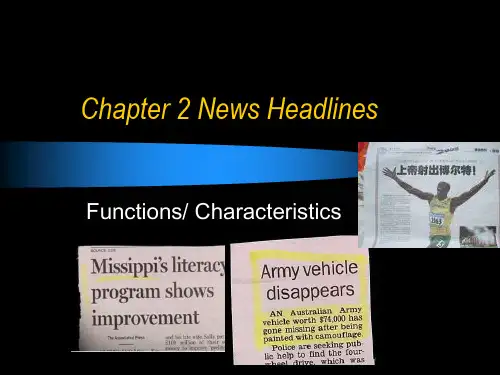

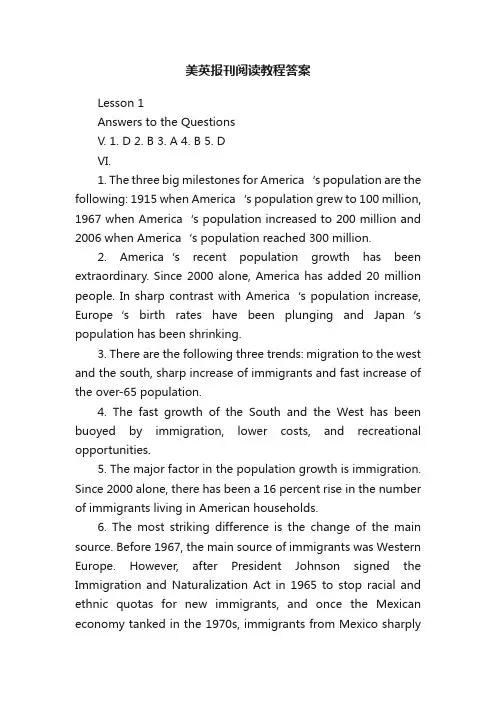
美英报刊阅读教程答案Lesson 1Answers to the QuestionsV. 1. D 2. B 3. A 4. B 5. DVI.1. The three big milestones for America‘s population are the following: 1915 when America‘s population grew to 100 million, 1967 when America‘s population increased to 200 million and 2006 when America‘s population reached 300 million.2. America‘s recent population growth has been extraordinary. Since 2000 alone, America has added 20 million people. In sharp co ntrast with America‘s population increase, Europe‘s birth rates have been plunging and Japan‘s population has been shrinking.3. There are the following three trends: migration to the west and the south, sharp increase of immigrants and fast increase of the over-65 population.4. The fast growth of the South and the West has been buoyed by immigration, lower costs, and recreational opportunities.5. The major factor in the population growth is immigration. Since 2000 alone, there has been a 16 percent rise in the number of immigrants living in American households.6. The most striking difference is the change of the main source. Before 1967, the main source of immigrants was Western Europe. However, after President Johnson signed the Immigration and Naturalization Act in 1965 to stop racial and ethnic quotas for new immigrants, and once the Mexican economy tanked in the 1970s, immigrants from Mexico sharplyincreased. In Fort Wayne, nearly 80 percent of Hispanics are Mexican. An estimated 12 million undocumented immigrants now live in America.7. According to the article, the influx of new immigrants has caused the problem of racial tensions.8. Back in 1990, the median age in America was 22.9 years. But with people having fewer babies, that number started to climb. Lower fertility rates mean older populations. The baby boom caused a brief pause in this movement during the 1950s and 1960s, but the aging trend has since resumed. The median age is up to 36.5 and is expected to rise to 39 by 2030 before leveling off.9. People like Mayor Bill Saffo consider the senior citizens asa real asset because they are active in the community, and they work part-time and create businesses.10. Its main attractions are its great beaches, low cost of living and abundant golf courses.11. The enlarged senior population will overburden Social Security and Medicare, the two largest entitlement programs.OutlineI. Growth of America‘s population(1—2)1. Population growth to 300 million in October, 20062. Extraordinary recent growth compared with other countriesII. America‘s population trends and their impacts(3—4)1. Three broad trendsa. Migration to the west and the southb. Sharp increase of immigrantsc. Baby-boomers‘ getting close to retirement age2. Great impacts of t he trends on America‘s culture, politics and economyIII. The new migration: case study of Boise(5—13)1. Boise‘s fast development2. Challenge for city planners3. Four-decade migration pattern4. Factors in the fast growth5. Sources of new residents in Boise6. Developers‘ purchase of land at a feverish pace7. Economic planners‘ effort to attract solid jobsIV. Big wave of immigrants(14—19)1. Increase of ethnic diversity at Northwood Middle School2. Fort Wayne‘s population composition change3. Fast growth of Hispanicsa. Example of Fort Wayneb. Example of Goshen4. Tensions caused by the influx of HispanicsV. Graying of America and its impacts(20—26)1. Onslaught of 77 million aging boomers2. Growth of America‘s median age3. Impacts of senior people‘s increase on the economy: case study of Wilmingtona. Attractions for the senior peopleb. Specific examples of Bill and Brydenc. Senior people‘s contribution to the local economyVI. Prospects of America‘s population change(27-31)1. Further acceleration of population growth2. Increase of population proportion of the South and the West3. Greater impacts of births by new immigrants4. Doubling of the over-65 population and the heavy loads on Social Security and MedicareLesson 2Answers to the QuestionsV. 1. B 2. A 3. A 4. A 5. DVI.1. Because they are pragmatic and resourceful in money matters. They not only work hard to earn more money, but also save for retirement, make investment and hedge against the unexpected.2. The first grim reality is that in about 30 years, just as the first of this age group step into retirement, the traditional Society Security System won‘t be able to support them. The second one is the decreased job security today. The third one is that they carry more debt at their age than any other generation had. All these factors force them to pay more attention to money matters.3. Matures are ―savers‖ whereas Xers are ―hedgers‖. Matures saved what they could so that their children might have more comfortable lives. But Xers do not have such an expectation. Their different attitudes toward money were shaped by the circumstances surrounding the youth. Aftereffects of the Depression and World War Ⅱforced the Matures to be self-sacrificing and frugal. Xers experienced many uncertainties and crises: the savings-and-loan debacle of the ?80s, recession of the early ?90s and parents‘divorce. All these experiences havehelped them to develop pragmatism and the habit of protecting against the expected.4. Because this generation is more interested and better versed in investment. A study by Amex shows that they take more risks on technology stocks.5. They are more eager to earn money through hard work and more interested in starting up their own businesses for profits.6. No. they are spending money to make the time before retirement a pleasure. They spend more money than Boomers did in the same span on stereos, cellphones, beepers, all new VW Jettas and GMC Sunfires.OutlineI. News Lead: general description of Gen-X(1—2)Definition: age span; total number; focus on money; buying powerII. Reasons for Xers‘ focus on money(3—7)1. Survival instinct2. Early awareness of the unsafe cover of the social security system3. Faced with decreased job security4. Burdened with heavy debtIII. Measures taken to prepare for the future(8—24)1. Saving for retirement2. Hedging against the unexpected3. Investing in stocksa. Taking more risks on technology stocksb. Drawing more attention from investment firmsc. Showing more interest in forming clubs4. Money-first work ethica. More willing to work hard, take more job offersb. More interested in starting up their own businessesc. More preoccupied with money-makingIV. Xers‘ purchasing power(25—26)1. Xers‘ consumption pattern2. Reason for the consumption patternLesson 3Answers to the QuestionsV. 1. B 2. A 3. C 4. B 5. DVI.1. They found those Korean-Americans isolated and helpless, and recognized the attacks as a threat to Asians as a whole. For many Asian-Americans, the riots represented as an assault on their faith in America.2. The total population of Asian-Americans is about 7.3 million. Nearly 2.5 million arrived during the 1980s. The fastest increasing groups are Koreans and Vietnamese. About half of Asian immigrants settle on the Pacific coast while hundreds of thousands move on to New York and dozens of cities in between.3. They were brought to the United States in the 1860s to work on continental railroads as coolies. They were ill-treated and vilified as a ―population befouled with all the social vices‖. In 1887, there occurred the Snake River Massacre in Oregon, in which 31 Chinese were robbed and murdered.4. Asian families earn an average of $35,900 per year, more than the average for white families. However, as the Asian familyis larger, their per capita income is actually less than that of white people.5. They are called the ―model minority‖ because of their superiority to o ther races in habits of study and work. They are said to embody the American Dream of hard work, thrift and success. Asians, however, rebel against the model-minority label as another insidious stereotype. They think that it is a subtly racist excuse not to help underprivileged Asians and to hold back even average Asians on the ground that they already h ave ―natural‖ advantages.6. Because they believe that Asian-Americans have accepted the white mainstream culture and white people love them for everything the blacks are not.7. They are making great efforts to preserve and acquire the Asian culture by improving their original language proficiency, attacking the model minority image and Asians who forget their original culture.8. The main obstacles are skin color and lack of English proficiency.9. The Indo-Chinese group is most noted for street gang activities. The main cause is unemployment.10. The ties within each small Asian group are close and family connections are strong. A key link in the system is rotating credit association. However, many Asians lack a larger sense of unity and bring ancient rivalries from native countries. Most Asian support groups are based on nationality or even smaller units.OutlineI. Impact of the Los Angeles riots(1—2)1. Korean sufferings and helpless state2. Assault on Asian-Americans‘ faith in AmericaII. Racial bias against Asian-Americans(3—7)1. Asian immigrants‘ uglified image in the past2. Present model-minority label and its harmful effects3. Resentment against Asians for their success and behavior4. Asians‘ isolation from the rest of the society5. Boycotts and assaults on Asian businessesIII. American culture‘s influence(8—12)1. Fast increase of Asian immigrants wishing to realize the American Dream2. Second generation‘s tendency to abandon Asian values3. Identity crisis resulting from two cultures‘ pu ll4. Young people‘s efforts to preserve the original culture5. The least assimilated group: Chinatown residentsIV. Discrimination against Asians(13—17)1. Hurdles for assimilation2. Glass ceiling3. UnemploymentV. Similarities and differences between Asians and Blacks(18—21)1. Similar sufferings2. Similar spiritualities3. Asian-Americans‘ less difficulty in shrugging off the legacy of discrimination4. First-generation Asian immigrants‘ incredibly hardworking and thrifty characterVI. Asians‘ ties and political status(22—24)1. Close community ties2. Lack of a larger sense of unity3. Underrepresentation at all government levelsVII. Author‘s view concerning the development of Asians‘ sentiment(25) Unlikely to become a wider political movement。
英美报刊选读_课文word整合版Unit2 Gender IssuesMen turn to jobs women usually do 1.HOUSTON - Over the last decade, Americanmen of all backgrounds have begun flocking to fields such as teaching, nursing and waiting tables that have long been the province of women.2."The way I look at it is that anything, basically,that a woman can do, a guy can do," said Miguel Alquicira, who graduated from high school when construction and manufacturing jobs were scarce and became a dental assistant.3.The trend began well before the crash,andappears to be driven by a variety of factors, including financial concerns, quality-of-life issues and a gradual erosion ofg ender stereotypes.4.In interviews, about two dozen men played downthe economic considerations, saying that the stigma associated with choosing such jobs had faded, and that the jobs were appealing not just because they offered stable employment, but because they were more satisfying.5."I.T. is just killing viruses and clearing paperjams all day," said Scott Kearney, 43, who tried information technology and other fields before becoming a nurse in the pediatric intensive care unit at Children's Memorial Hermann Hospital in Houston.6.An analysis of United States census data by TheNew York Times shows that from 2000 to 2010, occupations that are more than 70 percent female accounted for almost a third of all job growth for men, double the share of the previousdecade. 7.That does not mean that men are displacing women - those same jobs accounted for almost two-thirds of women's job growth. But in Texas, for example, the number of men who are registered nurses nearly doubled in that time period.8.The shift includes low-wage jobs as well.Nationally, two-thirds more men were bank tellers, almost twice as many were receptionists and two-thirds more were waiting tables in 2010 than a decade earlier.9.Even more striking is the type of men who aremaking the shift. From 1970 to 1990, according to a study by Mary Gatta, senior scholar at Wider Opportunities for Women, an organization based in Washington, D.C., and Patricia A. Roos, a sociologist at Rutgers University in New Jersey, men who took so-called pink-collar jobs tended to be foreign-born, non-English speakers with low education levels.10.Now, though, the trend has spread among men ofnearly all races and ages, more than a third of whom have a college degree. In fact, the shift is most pronounced among young, white, college-educated men like Charles Reed, a sixth-grade math teacher at Patrick Henry Middle School in Houston.11.Mr. Reed, 25, intended to go to law school after atwo-year stint with Teach for America, a national teacher corps of recent college graduates who spend two years helping under-resourced urban and rural public schools. But Mr. Reed fell in love with teaching. He says the recession had little to do with it, though he believes that, by limiting prospects for new law school graduates, it made his father, a lawyer, more accepting.12.To the extent that the shift to "women's work"has been accelerated by recession, the change may reversewhen the economy recovers. "Are boys today saying, 'I want to grow up and be a nurse?'" asked Heather Boushey, senior economist at the Center for American Progress."Or are they saying, 'I want a job that's stable and recession-proof?'"13.Daniel Wilden, a 26-year-old Army veteran andnursing student, said he had gained respect for nursing when he saw a female medic use a Leatherman tool to save the life of his comrade."She was a beast," he said admiringly.14.More than a few men said their new jobs werefar harder than they imagined. But these men can expect success. Men earn more than women even in female-dominated jobs. And white men in particular who enter those fields easily move up to supervisory positions, a phenomenon known as the glass escalator, said Adia Harvey Wingfield, a sociologist at Georgia State University.15."I hated my job every single day of my life," saidJohn Cook, 55, who got a modest inheritance that let him drop a $150,000-a-year database consultant's job to enter nursing school. 16.His starting salary will be two thirds lower, but database consulting does not typically earn hugs like the one Mr. Cook received from a girl after he took care of her premature baby sister. "It's like, people get paid for doing this kind of stuff?"Mr. Cook said, tears coming to his eyes as he recounted the episode.17.Several men cited the same reasons for seekingout pink-collar work that have drawn women to such careers: less stress and more time at home.At John G. Osborne Elementary School, Adrian Ortiz, 42,joked that he was one of the few Mexicans who made more in his native country, where he was a hard-working lawyer, than he did in the United States as a kindergarten teacher in a bilingual classroom. "Now," he said, "my priorities are family, 100 percent."18.Betsey Stevenson, a labor economist at theUniversity of Pennsylvania, said she was not surprised that changing gender roles at home, where studies show men are shouldering more of the domestic burden, are showing up in career choices. "We tend to study these patterns of what's going on in the family and what's going on in the workplace as separate, but they're very much intertwined," she said. "So as attitudes in the family change, attitudes toward the workplace have changed."19.In a classroom at Houston Community College,Dexter Rodriguez, 35, said his job in tech support had not been threatened by the tough economy. Nonetheless, he said, his family downsized the house, traded the new cars for used ones and began to live off savings, all so Mr.Rodriguez could train for a career he regarded as more exciting.20."I put myself into the recession," he said,"because I wanted to go to nursing school."Unit3 E-CommerceThe Post-Cash Economy1.In London, travelers can buy train tickets withtheir phones - and hold up the phones for the conductor to see. And in Starbucks coffee shops in the United States, customers can wave their phones in front of the cash register and pay for their soy chai lattes.2.Money is not what it used to be, thanks to theInternet. And the pocketbook may soon be destined for the dustbin of history - at least if some technology companies get their way.3.The cellphone increasingly contains theessentials of what we need to make transactions."Identification, payment and personal items," as Hal Varian, the chief economist at Google, pointed out in a new survey conducted by the Pew Research Center in Washington, D.C. "All this will easily fit in your mobile device and will inevitably do so."4.The phone holds and records plenty more vitalinformation: It keeps track of where you are, what you like and who your peers are. That data can all be leveraged to sell you things you never knew you needed.5.The survey, released last month by the PewResearch Center's Internet and American Life Project along with Elon University's Imagining the Internet Center in North Carolina, asked justover 1,000 technologists and social scientists to opine on the future of the wallet in 2020. Nearly two-thirds agreed that "cash and credit cards will have mostly disappeared" and been replaced with "smart" devices able to carry out a transaction.But a third of the survey respondents countered that consumers would fear for the security of transactions over a mobile device and worry about surrendering so much data about their purchasing habits.6.Sometimes, those with fewer options are theones to embrace change the fastest. In Kenya, a service called M-Pesa (pesa is money in Swahili) acts like a banking system for those who may not have a bank account. With a rudimentary cellphone, M-Pesa users can send and receivemoney through a network of money agents, including cellphone shops. And in India, several phone carriers allow their customers to pay utility bills and transfer small amounts of money over their cellphones.7.Several technology companies, big and small,are busy trying to make it easier for us to buy and sell all kinds of things without our wallets. A start-up,WePay, describes itself as a service that allows the smallest merchant - say, a dog walker - to get paid; the company verifies the reputations of payers and sellers by analyzing, among other things, their Facebook accounts. 8. A British start-up, called Blockchain, offers afree iPhone application allowing customers to use a crypto-currency called bitcoins, which users can mint on their computers.9. A company called Square began by offering asmall accessory to enable food cart vendors and other small merchants to accept credit cards on phones and iPads. Square's latest invention allows customers to register an account with Square merchants and pay simply by saying their names. The customer's picture pops up on the merchant's iPad.10.Google Wallet has been designed to sit in yourphone, be linked to your credit card, and let you pay by tapping your phone on a reader, using what is known as near field technology.But Google Wallet works on only four kinds of phones, and not many merchants are equipped for near field technology.11.Meanwhile, PayPal, which allows people tomake payments over the Internet, has quietly begun to persuade its users to turn to their cellphones. PayPal posted about $118 billion in total transactions last year and became thefastest-growing segment of eBay, its parent company.12."The physical wallet, which had no innovationin the last 50 years, will become an artifact,"John J. Donahoe, the chief executive of eBay, told me recently. The wallet would move into the cloud, and ideally, from his perspective, into PayPal. No more would the consumer worry about losing a wallet. Everything, he declared, would be contained within PayPal. It would also enable the company to collect vast amounts of data about customer habits, purchases and budgets.13.Mr. Donahoe said he wanted his company to become "a mall in your pocket."14.I recently described PayPal's plans to AlessandroAcquisti, an economist who studies digital privacy at Carnegie Mellon University in Pittsburgh. Mr. Acquisti smiled. If today all you need to do is enter your phone number and PIN when you visit a store, perhaps tomorrow, he said, that store will be able to detect your phone by its unique identifier. Perhaps, you won't have to shop at all. Your shopping data would be instead collected, analyzed and used to tell you exactly what you need: a motorcycle from Ducati or purple rain boots in the next size for your growing child. Money will be seamlessly taken from your account. A delivery will arrive at your doorstep. "In the future, maybe you won't have to pay," Mr. Acquisti offered, only half in jest."The transaction will be made for you."Unit4Cultural ExchangeAsia’s Endangered Species: the Expat1.Forget expats. Western companies doingbusiness in Asia are now looking to locals to fill the most important jobs in the region.2.Behind the switch, experts say, are severalfactors, including a leveled playing field in which Western companies must approach newly empowered Asian companies and consumers as equals and clients—not just manufacturing partners./doc/2216449449.html,panies now want executives who can securedeals with local businesses and governments without the aid of a translator, and who understand that sitting through a three-hour dinner banquet is often a key part of the negotiating process in Asia, experts say.4.In fact, three out of four senior executives hiredin Asia by multinationals were Asian natives already living in the region, according to a Spencer Stuart analysis of 1,500 placements made from 2005 to 2010. Just 6% were noncitizens from outside of Asia.5."It's a strategic necessity to be integrated in theculture. Otherwise, the time to learn all of it takes forever," said Arie Y. Lewin, a professor of strategy and international business at Duke University's Fuqua School of Business. He adds that locals may better navigate a business culture where copycats and competitors often play bydifferent rules.6.What's more, a failed expatriate hire can be acostly mistake and slow a firm's progress in the region, said Phil Johnston, a managing director at recruiter Spencer Stuart.7.To help companies fill Asia-based executiveroles, at least two search firms—Spencer Stuart and Korn/Ferry International—say they have begun classifying executives in four broad categories: Asia natives steeped in localculture but educated in the U.S. or Europe; the foreigner who has lived or worked in Asia for a long time;a person of Asian descent who was born orraised in a Western country but has had little exposure to Asia; and the local Asian executive who has no Western experience.8.For companies seeking local expertise, bothfirms said the first category is by far the mostsought-after. But Mr. Johnston said those candidates are difficult to find and retain, and they can command salaries of $750,000 to $1 million—on par with, and sometimes more than, their expat counterparts.9.German conglomerate Siemens AG in 2010hired Mei-Wei Cheng, a China-born Cornell University graduate, to head its Chinese operations—a role previously held by European executives.10.While Siemens's European executives had madeinroads with Chinese consumers—building sales in the region to nearly one-tenth of global revenue—the firm realized it needed someone who could quickly tap local business partners.11.After an extensive search, Siemens hired Mr.Cheng, formerly CEO at the Chinese subsidiaries of Ford Motor Co. and General Electric Co. GE12.The decision to hire locally seems to have paidoff for Siemens: In his first 18 months on the job, Mr. Cheng forged two wind-power jointventures with Shanghai Electric Group Co.13.Mr. Cheng communicates easily with localofficials, a major advantage when it comes to selling energy technology to individual cities, says Brigitte Ederer, head ofhuman resources for Siemens and a member of the company's managing board. Many local officials don't speak English.14.Bob Damon, president of recruiter Korn/FerryInternational's North American operations, said the current talent pool for executive roles is so limited that most top Asian executives simply rotate from one Western company to another, as Mr. Cheng did.15.Other companies are adding to the demand bycreating new positions in Asia.Campbell Soup Co. CPB last week announced the appointmentof Daniel Saw as its first-ever president of Asia operations, while Canadian conglomerate Bombardier Inc. BBD.B.T hired Albert Li to filla new role overseeing its aerospace business inChina. Both executives were born in Asia and have worked as regional managers for Western multinationals.16.Meanwhile, younger Chinese professionals arepositioning themselves to meet the need for executive talent in the years to come. Nearly four in 10 American M.B.A. programs say China was their fastest-growing source of foreign applicants last year, according to the Graduate Management Admission Council, which administers the Graduate Management Admission Test.17.Foreigners with no Asia experience, on the otherhand, need not apply, recruiters said. Spencer Stuart's Mr. Johnston said he occasionally receives inquiries from Western middle managers, proclaiming that they are finally ready to make a career move to the region. He advises them that "there is nothing about their experience that is interesting or relevant to Asia."18.In hubs like Singapore and Hong Kong, expatsreceive as much as $200,000 a year in subsidies for housing, transportation and private schooling, Mr. Johnston said. Payments to offset taxes for these benefits add up to another $100,000.Altogether, a bad match can cost a company as much as $1 million, after figuring in relocation costs, he said.19.Monster Worldwide Inc. Chief Executive SalIannuzzi said the company has been hiring locally for several years, in part because he found deploying expatriates cost too much. "Ittakes them six months to figure out how to take a ferry, they're there for 12 months, and then they spend the next six months figuring out how to get home," he said.20.Like some other companies, Monster now tracksits own workers to ensure a pipeline of talent. 21.The online job-search company's current head ofChina operations, Edward Lo, a former fraternity brother of Mr. Iannuzzi, understands the local scene, is well connected in China and knows how to recruit, Mr. Iannuzzi said.Among Mr. Lo's duties: finding his own successor before he retires.22.Starwood Hotels & Resorts Worldwide Inc.based in White Plains, N.Y., also develops its own leaders for Asia, plucking people who have come up through the company ranks. For example, the head of Asia Pacific started in the 1970s on the finance team in Hong Kong, and the head of the Middle East region was a hotel manager who worked his way up.23.Having grown up in their markets, managersunderstand customer needs, said Starwood CEO Frits van Paasschen. Regional heads in China, for instance, know that whendealing with land owners or developers, deals are less "transactional," and more "trust-based," he said.They also know that Chinese travelers—who now comprise the majority of hotel guests in the region—feel more at home when they're supplied with tea kettles, slippers and chopsticks, headded.24.For fast-food company Yum Brands Inc. CEODavid Novak calls his Asia-bred regional head and executive team "our single biggest competitive advantage." China has become the company's biggest earnings driver, comprising more than 40% of operating profit.25.Thanks to Yum's China leaders, Mr. Novak says,KFC in China began serving rice porridge and soy milk for breakfast, and Pizza Hut now offers an afternoon tea menu—both of which have been big hits among local customers.Unit5Auto-WorldThe Future of the Car :Clean, Safe and it Drives itselfCars have already changed the way we live. They are likely to do so again1.SOME inventions, like some species, seem tomake periodic leaps in progress. The car is one of them. Twenty-five years elapsed between Karl Benz beginning small-scale production of his original Motorwagen and the breakthrough, by Henry Ford and his engineers in 1913, that turned the car into the ubiquitous, mass-market item that has defined the modern urban landscape. By putting production of the Model T on moving assembly lines set into the floor of his factory in Detroit, Ford drastically cut the time needed to build it, and hence its cost. Thus begana revolution in personal mobility. Almost abillion cars now roll along the world’s highways.2.Today the car seems poised for another burst ofevolution. One way in which it is changing relates to its emissions. As emerging markets grow richer, legions of new consumers are clamouring for their first set of wheels. For the whole world to catch up with American levels of car ownership, the global fleet would have to quadruple. Even a fraction of that growth would present fearsome challenges, from congestion and the price of fuel to pollution and global warming.3.Yet, as our special report this week argues,stricter regulations and smarter technology are making cars cleaner, more fuel-efficient and safer than ever before. China, its cities choked in smog, is following Europe in imposing curbs on emissions of noxious nitrogen oxides and fine soot particles. Regulators in most big car marketsare demanding deep cuts in the carbon dioxide emitted from car exhausts. And carmakers are being remarkably inventive in finding ways to comply.4.Granted, battery-powered cars have disappointed.They remain expensive, lack range and are sometimes dirtier than they look—for example, if they run on electricity from coal-fired power stations. But car companies are investing heavily in other clean technologies. Future motorists will have a widening choice of super-efficient petrol and diesel cars, hybrids (which switch between batteries and an internal-combustion engine) and models that run on natural gas or hydrogen. As for the purely electric car, its time will doubtless come.Towards the driverless, near-crashless car 5.Meanwhile, a variety of ―driver assistance‖technologies are appearing on new cars, which will not only take a lot of the stress out of driving in traffic but also prevent many accidents. More and more new cars can reverse-park, read traffic signs, maintain a safe distance in steady traffic and brake automatically to avoid crashes. Some carmakers are promising technology that detects pedestrians and cyclists, again overruling the driver and stopping the vehicle before it hits them.A number of firms, including Google, are busy trying to take driver assistance to its logical conclusion by creating cars that drive themselves to a chosen destination without a human at the controls. This is where it gets exciting.6.Sergey Brin, a co-founder of Google, predictsthat driverless cars will be ready for sale tocustomers within five years. That may be optimistic, but the prototypes that Google already uses to ferry its staff (and a recent visitor from The Economist) along Californian freeways are impressive. Google is seeking to offer the world a driverless car built from scratch, but it is more likely to evolve, and be accepted by drivers, in stages.7.As sensors and assisted-driving softwaredemonstrate their ability to cut accidents, regulators will move to make them compulsory for all new cars. Insurers are already pressing motorists to accept black boxes that measure how carefully they drive: these will provide a mass of data which is likely to show that putting the car on autopilot is often safer than driving it.Computers never drive drunk or while texting. 8.If and when cars go completely driverless—forthose who want this—the benefits will be enormous. Google gave a taste by putting a blind man in a prototype and filminghim being driven off to buy takeaway tacos. Huge numbers of elderly and disabled people could regain their personal mobility. The young will not have to pay crippling motor insurance, because their reckless hands and feet will no longer touch the wheel or the accelerator. The colossal toll of deaths and injuries from road accidents—1.2m killed a year worldwide, and 2m hospital visits a year in America alone—should tumble down, along with the costs to health systems and insurers.9.Driverless cars should also ease congestion andsave fuel. Computers brake faster than humans.And they can sense when cars ahead of them are braking. So driverless cars will be able to drive much closer to each other than humans safely can. On motorways they could formfuel-efficient ―road trains‖, gliding along in the slipstream of the vehicle in front. People who commute by car will gain hours each day to work, rest or read a newspaper.Roadblocks ahead10.Some carmakers think this vision of the future is(as Henry Ford once said of history) bunk.People will be too terrified to hurtle down the motorway in a vehicle they do not control: computers crash, don’t t hey? Carmakers whose self-driving technology is implicated in accidents might face ruinously expensive lawsuits, and be put off continuing to develop it.11.Yet many people already travel, unwittingly, onplanes and trains that no longer need human drivers. As with those technologies, the shift towards driverless cars is taking place gradually.The cars’ software will learn the tricks that humans use to avoid hazards: for example, braking when a ball bounces into theroad, because a child may be chasing it. G oogle’s self-driving cars have already clocked up over 700,000km, more than many humans ever drive;and everything they learn will become available to every other car using the software. As for the liability issue, the law should be changed to make sure that when cases arise, the courts take into account the overall safety benefits of self-driving technology.12.If the notion that the driverless car is round thecorner sounds far-fetched, remember that TV and heavier-than-air flying machines once did, too.One day people may wonder why earlier generations ever entrusted machines as dangerous as cars to operators as fallible as humans.Unit6 RomanceThe Modern Matchmakers现代红娘Internet dating sites claim to have brought scienceto the age-old question of how to pair offsuccessfully. But have they?互联网相亲网站声称已经将科技运用如何成功配对的问题之上。
英语报刊选读参考答案英语报刊选读Journalistic Reading 教师用书Teacher’s Book总主编王嘉褆主编林玫刘雁BOOK ONE (2)UNIT 1 Campus (2)UNIT 2 Entertainment .............................................................................................. 5 5 UNIT 3 Entertainment .............................................................................................. 9 9 UNIT 4 Food . (12)UNIT 5 Crime (15)UNIT 6 Disaster (19)UNIT 7 Sports (23)UNIT 8 Art (28)UNIT 9 Economy (31)UNIT 10 Ecology (36)UNIT 11 Health (39)UNIT12 Automobile & Driving (43)UNIT 13 Quality problems (48)UNIT 14 Shopping (52)UNIT 15 Gun control (56)UNIT 16 Psychology (59)BOOK ONEUNIT 1 Campus I . Vocabulary Builder 1. Definition1) chaotic : extremely disorganized; badly organized; be in mess 2) primary : main; most important; key; major; chief; prime; principal 3) seduce : attract; tempt 4) highlight : the most important, interesting, or enjoyable part of something such as a holiday, performance, or sports competition 5) reluctant : unwilling 6) compelling : : very very very interesting interesting interesting or or or exciting, exciting, exciting, so so so that that that you you you have have have to to to pay pay attention 7) reveal : show; indicate 8) mainstream : : accepted accepted accepted by by by or or or involving involving involving most most most people people people in in in a a a society; society; normal; ordinary 9) critical: important; crucial 10) evolution : a long, gradual process during which something develops and changes, usually becoming more advanced; a gradual change and development 2. Terms translation 1) a bipartisan consensus 2)high school diploma 3)drop-out rate 4)college wage premium 5)the K-12 system 6)more academically rigorous 7)well-rounded citizens 8)certification tests 9)career and technical education 3. Blank filling1) persevered 2) persisted 3) insisted 4) insisted 5) persevere 6) agony 7) adversity 8) torment 9) plight 10) assure/reassure 11) insure/ensure 12) insure 13) insure/ensure 14) assured/reassured II.Translation1.选择圣路易斯的华盛顿大学是个不错的决定,但真正让我享受到理想大学生活的,(不是大学本身)是我到了大学后作的一些决定。
英美报刊选读News agencyAP-associated press 美联社UP-united press international (美)合众国际社Reuters-Reuter’s News Agency (英)路透社PA-press association (英)报纸联合社DPA-Deutsche Presse Agentur 德新社AFD-Agence France Presse法新社ANSA-Agenzia Nazionale Stampa Associata 意大利安莎通讯社What is news?News is the reporting of anything timely, which has importance, use, or interest to a considerable number of persons in a publication audience.News is any event, idea or opinion that is timely, that interests or affects a large number of people in a community and that is capable of being understood by them. What are news values?1. Timeless and freshness2. Importance, consequences, impact or significance.3. Prominence4. Neamess, proximity or locality5. Unusualness, bizarreness, oddity or novelty6. InterestWhat is journalese?Journalese: style of writing 新闻之风English of a style featured by use of colloquialisms, superficially of thought or reasoning, clever or sensational presentation of material, and evidences of haste in composition,considered characteristic of newspaper writing‖W ebster’s W ednesday‖.What is journalism?1.What is journalistic English?新闻英语Journalistic English aims at the study of English, newspapers, periodicals, radio, television and other media of communication.2.What is journalismJournalism is the collection and periodical publishing of news. It includes writing for, editing and managing such media as the newspaper and the periodical.Types of journalism1.news消息Pure hard news ( brief 栏)题材严肃,时新性Soft news 人情味浓,写法轻松活泼2.feature 特写再现新闻事件,人物和场量Suspended interest of form3.editorial &commentary社论和评论代表低级或杂志编辑部发表的权威性评论,有时很难懂OP-ED (the New Y ork Times)Opinion page (Newsweek)Today and tomorrow (New Y ork herald tribune)AdvertisementNewspaper format1. Broadsheet 大报(严肃的,高质量的,报道真相)A1 paper2.tabloid 小报(普通的,贫民的,引起轰动的,提供娱乐的)A2 paper有些小报也是严肃的大报,比如:The Christian Science MonitorThe GuardianEmergence of newspaper sections1.news2.features3.sports4.business5.editorial/ OP-ED6.classifieds7.science and technology8.life9.health10.entertainmentThe front pageFl ag/nameplate/masthead 报头Feasers 报耳hold 全文报道rail 预告栏gutter 中缝Byline 署名jumpline 跳页指示Dateline 电头Dateline ROM.nov.8 Moscow.oct.10 (AP) Associated press完整的新闻组成(倒金字塔)HeadlineThe leadBody消息主体:倒金字塔式The inverted pyramid form1. Intro containing most important or most interesting information (more facts)2. Supporting information or background3. Quotes or more facts of lesser importance4. Minor detail5. Least significant informationLead 导语一般是消息的第一个自然段,有时也有两个自然段,是消息的概括。